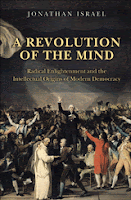The steady rise of Radical Enlightenment ideals
Recently I have referred to the influence on modern societies of ideas and values from the Enlightenment. Here I call Enlightenment values an important basis for the progress which has happened in the Western world over the last two centuries and suggest that the rest of the world can benefit from them as much (which is actually happening more and more).
An interesting and profound book about the Enlightenment is A Revolution of the Mind: Radical Enlightenment and the Intellectual Origins of Modern Democracy by Jonathan Israel, professor at Princeton. In the book he explains that the ideals of modern democracies - freedom of thinking and expression, religious tolerance combined with separation of church and state, eradication of religious authority from the legislative process and education, individual liberty, political self-determination of peoples, and sexual and racial equality - which, today, have been accepted in the world to an ever higher degree, primarily originate from a branch of the Enlightenment which was once vilified, the, what he calls, Radical Enlightenment, which emerged roughly from 1770 and which build upon the work of, among others, Baruch Spinoza (1632-1677).
It is interesting to read how these ideas, despite heavy opposition, have become increasingly more normal to people and to understand how good these ideas work. I think this process of blooming of these ideas isn't far from over. At many places there is still much resistance against each of these ideals. For example, many people still do not believe in equal rights for men and women or for people of different sexual orientations. Also, the value of the separation of church and state is not generally accepted and in even in many modern countries this separation is incomplete.
I predict that in 100 years the ideals from the Radical Enlightenment will have even become more accepted and more fully implemented in even larger parts of the world. And the world will benefit from it.
An interesting and profound book about the Enlightenment is A Revolution of the Mind: Radical Enlightenment and the Intellectual Origins of Modern Democracy by Jonathan Israel, professor at Princeton. In the book he explains that the ideals of modern democracies - freedom of thinking and expression, religious tolerance combined with separation of church and state, eradication of religious authority from the legislative process and education, individual liberty, political self-determination of peoples, and sexual and racial equality - which, today, have been accepted in the world to an ever higher degree, primarily originate from a branch of the Enlightenment which was once vilified, the, what he calls, Radical Enlightenment, which emerged roughly from 1770 and which build upon the work of, among others, Baruch Spinoza (1632-1677).
It is interesting to read how these ideas, despite heavy opposition, have become increasingly more normal to people and to understand how good these ideas work. I think this process of blooming of these ideas isn't far from over. At many places there is still much resistance against each of these ideals. For example, many people still do not believe in equal rights for men and women or for people of different sexual orientations. Also, the value of the separation of church and state is not generally accepted and in even in many modern countries this separation is incomplete.
I predict that in 100 years the ideals from the Radical Enlightenment will have even become more accepted and more fully implemented in even larger parts of the world. And the world will benefit from it.

Comments